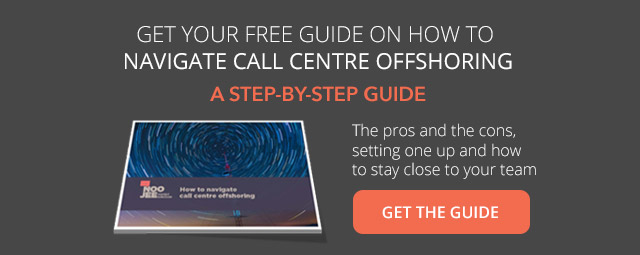How to make customers feel safe with an offshore help desk

How to make customers feel safe with an offshore help desk
Does the thought off an offshore help desk already give you the shivers? Does it evoke the idea of noise, chaos and unintelligible agents working cheek by jowl? Of dodgy phone reception and getting stuck in endless queues?
Sadly, these are the experiences of some who’ve called an offshore call centre. They’ve called because they have a problem, and then they have to deal with the other problem of a dodgy inbound experience that leaves them in no mans land. It shouldn’t be that hard, but often it is. And when you add offshore to the mix, to some this reads like the final straw that will break the camels back.
So what’s the solution? The reality is being offshore is secondary to an inbound support service that doesn’t work. So to give your offshore agents every chance of success, make sure you set them up with the right tools and systems, so where they’re from becomes a complete irrelevance.
Use IVRs that won’t waste your caller’s time
Inject trust into the equation with a smart IVR. From the moment an inbound call comes in, you want an IVR that can give your customer a smooth and personalised experience; with clear options of what to press, in as few steps as possible, and that leads to the right agent every time.
If your IVR is slow, unintuitive and sends a caller around in circles, then you’ve already lost their trust. Not a good place for an agent to start if the customer’s already hostile.
Specify some calls to route to onshore agents
If intimacy and local knowledge is what some customers want, identify these VIP callers and specify they only go through to onshore agents. With call centre software this is easy and you can also schedule callbacks to only be taken by local agents.
You can also route numbers based on whether they’re high or low priority, using identifiers you’ve set (area code, return customers and more). Again, who they go to is for you to decide; such as highest priority calls going through to your onshore agents and lower priority or overflow to your offshore agents.
Minimise the time delay as much as possible
Keep time delays to a minimum where you can. A few seconds is all it can take for a customer to form a dim view of your offshore help desk; no words spoken, just the cardinal sin of being suspended in time instead of receiving help.
But what’s a few seconds, you say? Like waiting for a computer to turn on or thick toast to cook, it’s often the small things that take too long that are often the worst. So nip any time lag in the bud where you can.
The best way to get around this is to locate your offshore call centre team as close to the caller’s location as possible. If it’s Australia, then having a team in New Zealand or the Philippines is close enough to have minimal time delay. Further away than this, then call quality may start to deteriorate and a bigger time delay will occur. These laws of physics you can’t avoid.
Hire and train agents to cultural norms
Empathy, a willingness to listen, asking the right questions, and good problem solving is exactly what callers want from an offshore help desk agent. So make sure you hire the right agents in the first place.
Regular training of your offshore call centre agents is also really important. Not only in the call software they’re using, but also in the cultural norms of the customers they talk to. There could be a set of things you want them to keep in mind, such as:
- Ways to greet and say goodbye (‘oi’ is not a good start)
- Things you should never ask (like are there any convicts in your family?)
- Things you should never promise (like a rain, wind or drought-free wedding in Victoria)
- Words that are ‘no go’ zones (‘thong’ is a good start)
- Turn of phrases that can be misunderstood (like ‘fair suck of the sauce bottle’, just ask Kevin)
- Humour that people like or that may offend (walking into bars or Irish jokes please avoid)
These kinds of tips are always handy for an overseas agent, who may handle clients from all around the globe, and need to know the different cultural sensibilities.
Use cultural differences to your advantage
Cultural differences can be quite charming if framed in the right way. I personally really enjoy the ultra-polite American style of ‘hello ma’am’ when talking to an agent from the Philippines. Especially if this politeness is matched with a willingness to help out no matter what. This unfaltering level of service can make any cultural difference melt away.
A little bit of small talk also helps to break the ice, letting your agents show they have a human side. Asking contextual things like, ‘How’s the weather in Melbourne today?’ is a good start. Ok, sure it’s a boring question; however, mentioning a situational thing is a great way of making an agent feel closer.
Apply local area codes to call backs
Perhaps your support agents are calling a customer back to give them some more help. No-one’s picking up and your agents are wasting valuable time. Then you find out it’s the international code.
No one likes the unfamiliar. An unrecognisable foreign number is one of those blights on a phone screen that people love to ignore. This is not a good way for reps to be spending their time. Luckily, the remedy for this is easy.
Using call centre software with an Australian-based server, you can easily apply a local area code to offshore caller IDs. All numbers look local, and a number with a familiar area code is 50% more likely to be picked up on the first call.
Bringing your offshore help desk agents closer
The most important thing in all of this is to ensure that your offshore help desk agents have full access to the right customer information.
Dynamic agent interfaces help with this. Agents can view customer information on a well laid out dashboard that refreshes with every call. If your phone software also automatically integrates to external CRMs your agents can also trust that the customer information they’re using is always up to date.
Live monitoring, training and mentoring is also a good habit to get into. Here you can help agents that are struggling with difficult support calls. With cloud-based software, from your own dashboard you can tweak scripts they may have, offer advice about different approaches, and offer ongoing online training to help them where they’re falling down.
The end result of this is that if your agents have all the right information at their fingertips, they’ll have more chance of delivering the ultimate customer experience. And with the ultimate customer experience…well this is the best way to make your customers feel safe with an offshore help desk.
Want to find out more about offshoring?
Flickr cc: purplejavatroll

